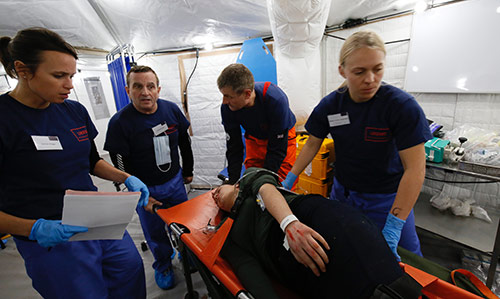Emergency Medical Teams project with HKAM
This is a joint project between HCRI and the Hong Kong Jockey Club Disaster Preparedness and Response Institute (HKJCDPRI), a part of the Hong Kong Academy of Medicine. The collaboration within this project will accelerate the development of an international verification and certification process of disaster response training based on WHO standards with a focus on China and Asia.
Background
HCRI and Hong Kong Academy of Medicine (HKAM) Emergency Medical Teams (EMT) project
It has been established too many well-intended responses to sudden onset disasters were ineffective or poorly managed. This may have been due to health practitioners acting outside of their area of expertise, teams lacking in terms of basic logistical capacities, or poor coordination with local authorities. As such, there has been an initiative from the WHO to classify different standards of emergency medical teams and thereby improve their quality and accountability.

Haiti – example of poorly managed response to sudden onset disaster
The disaster response environment in Haiti following the 2010 earthquake represented a complex healthcare challenge.
Researchers at HCRI produced a study that identified specific challenges created by the Haiti disaster response. These included accountability, professional ethics, standards of care, unmet needs, patient agency and expected outcomes for patients in such settings. They found that key first steps to improving the international response are a minimum dataset and uniform reporting.
Sadly, there are still some doctors who respond to disasters uninvited by host governments, unauthorised to practice in that country, ill-equipped and ill-prepared to carry out procedures for which they are not licensed in their home country, and even without the proper consent of the patient.
Tony Redmond OBE / Emeritus Professor
Haiti was a clear example of an ineffective response to a sudden onset disaster, and highlighted many issues that have been seen elsewhere.
Chinese EMTs
HCRI’s involvement with Chinese EMTs stems from Professor Redmond’s work to lead a surgical team into the area affected by China’s Sichuan earthquake in 2008. The earthquake led to the Hong Kong Jockey Club funding an Institute for Disaster Management and Response to help increase their capacity in the face of such disasters with Tony as their international adviser.
By countries such as China establishing core training programmes and minimum standards as we are in the UK, we can show how this should be done, and ensure that the most vulnerable are given the best possible care at their time of greatest need.
Tony Redmond OBE / Emeritus Professor
About
The project will deliver core training, a curriculum, and a range of further training including specialist, technical – such as learning to adapt surgical techniques to work in the field – and simulation training.
HCRI is suitably placed to work with HKJCDPRI in this capacity. Researchers here have published on the need for curricula that meet the WHO EMT initiative classification and standards, concluding that collaborative efforts between WHO, operational EMT organisations, universities, professional bodies and training agencies should be developed to that end. This project is such a collaborative effort.
The aim is to strengthen the existing capacity of the Chinese emergency medical teams deploying overseas and to support and develop their alignment with the WHO Global EMT standards so as to become part of the WHO Global Registry of EMTs. As a part of the UK International Emergency Medical Team newly verified by the WHO, UK-Med and HCRI are in an excellent position to work with HKJCDPRI towards this aim.
One area which this collaboration is aiming to develop, via funding a PhD project, is medical record keeping in sudden onset disasters. Members of the research team are a part of the WHO minimum data set (MDS) working group and have been using this experience to build on existing knowledge around how records are kept and how the MDS will fit practically into use during a deployment.
People
- Emeritus Professor Tony Redmond OBE - HCRI Deputy Director and Professor of International Emergency Medicine
- Dr Darren Walter - Programme Director of Online Programmes and Senior Lecturer in Emergency Global Health
- Dr Anisa Jafar - NIHR Academic Clinical Lecturer
- Dr Adele Aubrey - HCRI Manager
- Dr Stephanie Rinaldi - RIAH Programme Manager
News and publications
More news and publications will be added as the project progresses.
Contact
For further information on the project, please contact stephanie.rinaldi@manchester.ac.uk.
